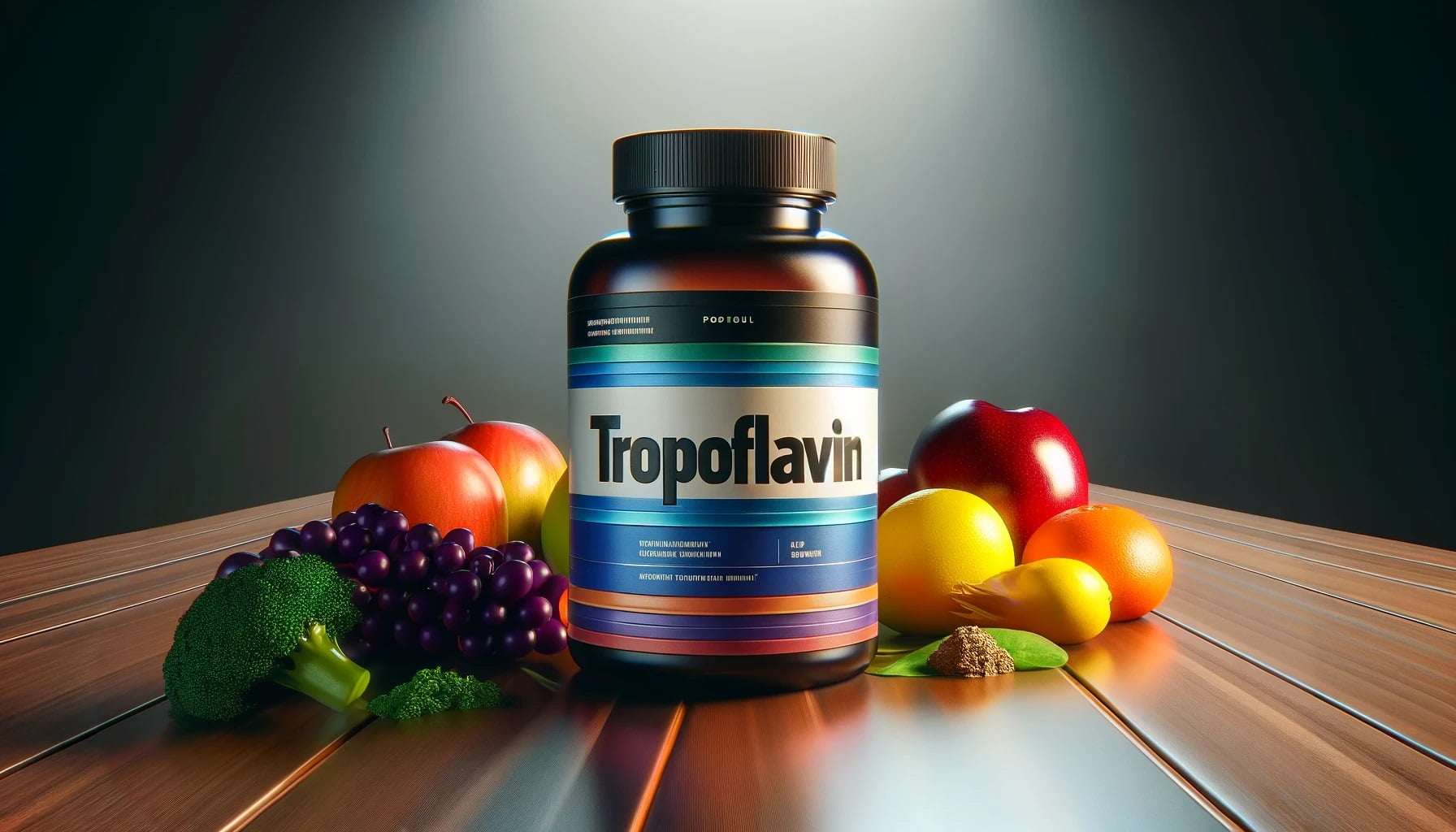
7,8-Dihydroxyflavone is a naturally occurring flavonoid found in various plants.
It mimics brain-derived neurotrophic factor (BDNF), enhancing memory, learning, and neuroplasticity.
7,8-DHF shows promise in treating neurological conditions and age-related cognitive decline.
While it’s found in fruits, vegetables, and herbs, it’s also available as a supplement.
However, its effects on humans are not fully understood, and potential side effects and interactions exist.
Table of Contents
What Is 7,8-Dihydroxyflavone?
7,8-Dihydroxyflavone (also known as 7,8-DHF or tropoflavin) is a naturally occurring molecule belonging to the flavone class of flavonoids.
Flavonoids like 7,8-DHF are widely recognized for their presence in various plants, contributing to the vivid colors of fruits and flowers, as well as providing protective effects against environmental stresses.

The study of 7,8-Dihydroxyflavone expanded into its effects on human health, particularly looking at how it could mimic the activity of brain-derived neurotrophic factor (BDNF), a protein essential for the survival and function of neurons.
In terms of its uses, 7,8-DHF has been explored for its potential applications in treating neurological conditions due to its ability to penetrate the blood-brain barrier.
Additionally, it has been studied for its anti-inflammatory and antioxidant properties, making it of interest not just in neurology but also in fields concerned with systemic oxidative stress and inflammation.
What Are the Physical Properties of 7,8-Dihydroxyflavone?
7,8-DHF is an organic compound with the molecular formula C15H10O4. It is soluble in organic solvents and has a characteristic color, odor, and taste associated with flavonoid compounds.
| Property | Value |
|---|---|
| Molecular Weight | 254.24 g/mol |
| Melting Point | 275-277 °C |
| Solubility | Soluble in organic solvents |
What Are the Best Sources of 7,8-Dihydroxyflavone?
7,8-Dihydroxyflavone is found naturally in several plant-based food sources, including:
- Fruits: Apples, berries, grapes, and citrus fruits
- Vegetables: Onions, kale, broccoli, and spinach
- Herbs: Parsley, thyme, and oregano
Besides these natural sources, 7,8-DHF is available in the form of supplements for easy and calculated consumption.
What Are the Cognitive Benefits of 7,8-Dihydroxyflavone?

7,8-Dihydroxyflavone, being a powerful flavonoid, has significant potential to enhance various aspects of cognitive function.
Its molecular structure allows it to interact beneficially with brain mechanisms, supporting mental processes such as memory, learning, and cognitive resilience against neurological challenges.
How Does 7,8-DHF Enhance Memory Retention?
Clinical studies indicate that 7,8-DHF improves memory by mimicking the activity of brain-derived neurotrophic factor (BDNF), which is crucial for memory formation and consolidation. By activating TrkB receptors, 7,8-Dihydroxyflavone facilitates the synaptic plasticity necessary for learning and memory.(1)
Research in rodent models has shown enhanced memory performance, suggesting potential benefits in human cognitive disorders.
Can Tropoflavin Improve Learning Abilities?
Yes, Tropoflavin has demonstrated the potential to enhance learning in animal studies by promoting neurogenesis and synaptic connectivity.(2) It modulates neurotransmitter systems that are essential for learning processes, particularly in the hippocampus, the brain’s key area for learning.
Does 7,8-DHF Help with Cognitive Recovery After Injury?
Yes, preclinical studies suggest that 7,8-DHF can aid cognitive recovery following brain injuries by fostering neuroprotection and neuroregeneration.(3) It reduces neuronal death and supports the growth of new neurons, potentially improving cognitive functions impaired by traumatic or ischemic injuries.
What Role Does 7,8-Dihydroxyflavone Play in Aging-Related Cognitive Decline?
Emerging research indicates that 7,8-DHF might slow cognitive decline associated with aging by protecting against oxidative stress and inflammation, common factors in age-related cognitive diseases.
By enhancing BDNF levels and TrkB receptor activation, it helps maintain cognitive resilience, although more human studies are required to explore these effects thoroughly.(4)
How Effective Is Tropoflavin in Treating Cognitive Symptoms of Depression?
Studies suggest that Tropoflavin could improve cognitive impairments in depression by modulating the serotonin and dopamine pathways, which influence mood and cognitive functions.(5)
Its ability to induce BDNF expression also plays a crucial role in combating the neurodegenerative aspects of depression, potentially enhancing both mood and cognitive capacity.
Can 7,8-DHF Improve Attention and Executive Functions?
Preliminary animal studies have shown that 7,8-DHF can improve attention and executive functions by enhancing neurotransmitter modulation and neural connectivity in brain regions involved in these processes.
What Are the Health Benefits of 7,8-Dihydroxyflavone Beyond Cognitive Enhancement?
Emerging research highlights the therapeutic potential of 7,8-dihydroxyflavone (7,8-DHF) beyond cognitive enhancement, suggesting its effectiveness in treating a variety of health conditions:
- Cancer
- Cardiovascular health
- Skin and hair health
- Wound healing
How to Supplement with 7,8-Dihydroxyflavone?
When considering supplementing with 7,8-Dihydroxyflavone, it’s essential to consult a healthcare professional due to its varied effects and lack of established dosages for humans.
Potential risks include gastrointestinal distress, hormonal imbalances, neurological symptoms, liver issues, and allergies. It may also interact with certain medications and is not recommended for pregnant or breastfeeding women, or those with specific health conditions like hormone-sensitive cancers or bleeding disorders.
What Is the Recommended Dosage of 7,8-Dihydroxyflavone?
The recommended dosage of tropoflavin has not been definitively established for human use, as most existing research is based on preclinical (in vitro or animal) studies.
In animal models, doses have varied widely, generally within the range of 5 mg/kg to 30 mg/kg, tailored to specific therapeutic goals and conditions.
Given that, it’s crucial for individuals considering its use to consult healthcare professionals.
What Are the Side Effects of Excessive 7,8-Dihydroxyflavone Intake?
While specific side effects in humans are not well-documented due to limited clinical research, theoretical concerns based on 7,8-Dihydroxyflavone pharmacological properties include:
- Gastrointestinal Distress – High doses could irritate the digestive tract.
- Hormonal Imbalance – As it mimics certain hormonal activities, it might disrupt normal hormonal regulation.
- Headaches and Dizziness – Possible effects due to changes in neurotransmitter levels.
- Liver Toxicity – High concentrations might stress the liver, similar to other potent compounds.
- Allergic Reactions – As with many bioactive compounds, there is a potential for allergic reactions in sensitive individuals.
Careful monitoring and more research are necessary to better understand the safety profile of 7,8-Dihydroxyflavone, especially at higher doses or with long-term use.
Can 7,8-Dihydroxyflavone Have Interactions with Medications or Other Supplements?
There may be potential interactions between 7,8-dihydroxyflavone and certain medications or supplements. Flavonoids can influence the activity of drug-metabolizing enzymes, which may alter the effectiveness or safety of some medications.
Here are some examples of possible interactions:
- Cytochrome P450 enzyme system
- Blood-thinning medication
- Antidepressants
- Supplements affecting neurotransmitter levels
Is 7,8-Dihydroxyflavone Supplementation Safe During Pregnancy and Breastfeeding?
The potential risks of 7,8-dihydroxyflavone supplementation during pregnancy and breastfeeding have not been thoroughly studied.
Due to the lack of safety data, it’s generally recommended to avoid using this flavonoid supplement during these sensitive periods.
Can individuals with pre-existing health conditions use 7,8-DHF?
7,8-Dihydroxyflavone may interact with certain medical conditions, potentially influencing disease progression or treatment outcomes.
For example, individuals with hormone-sensitive cancers should exercise caution when considering this flavonoid, as it may have estrogenic effects.
Additionally, people with bleeding disorders or those undergoing surgery should consult their healthcare provider before using 7,8-dihydroxyflavone, as it may affect blood clotting.
It’s essential to discuss any pre-existing medical conditions with a qualified healthcare professional to determine the suitability and safety of 7,8-dihydroxyflavone supplementation.
- Zhang, Zhentao, et al. “7, 8-dihydroxyflavone prevents synaptic loss and memory deficits in a mouse model of Alzheimer’s disease.” Neuropsychopharmacology 39.3 (2014): 638-650.↩
- Du, X., and R. A. Hill. “7, 8-Dihydroxyflavone as a pro-neurotrophic treatment for neurodevelopmental disorders.” Neurochemistry international 89 (2015): 170-180.↩
- Krishna, Gokul, et al. “7, 8-Dihydroxyflavone facilitates the action exercise to restore plasticity and functionality: Implications for early brain trauma recovery.” Biochimica et Biophysica Acta (BBA)-Molecular Basis of Disease 1863.6 (2017): 1204-1213.↩
- Zeng, Yan, et al. “7, 8‐dihydroxyflavone rescues spatial memory and synaptic plasticity in cognitively impaired aged rats.” Journal of neurochemistry 122.4 (2012): 800-811.↩
- Liu, Xia, et al. “A synthetic 7, 8-dihydroxyflavone derivative promotes neurogenesis and exhibits potent antidepressant effect.” Journal of medicinal chemistry 53.23 (2010): 8274-8286.↩
